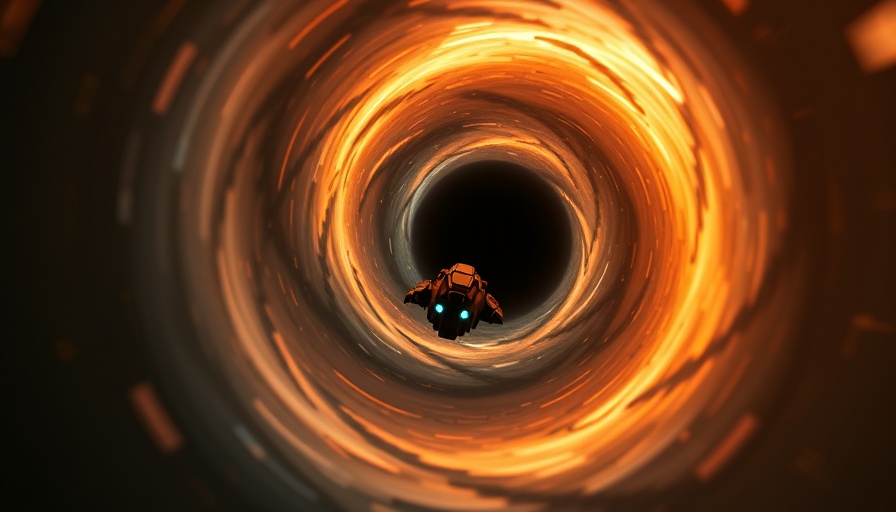
Exploring the Future of Black Hole Research
The concept of sending a spacecraft the size of a paperclip to a black hole might sound like the plot of a science fiction novel, yet it is grounded in a visionary plan proposed by astrophysicist Cosimo Bambi. This aim, which hinges on significant advancements over the next few decades, could potentially lead to groundbreaking discoveries regarding the laws of physics and our understanding of black holes.
Unveiling the Mysteries of Black Holes
Black holes represent some of the universe's most enigmatic objects, with their gravitational pull so strong that nothing, not even light, can escape them. As scientists seek to understand these cosmic giants more thoroughly, Bambi's proposal touches on two main challenges: identifying a suitable black hole and developing the necessary technology to reach it.
Currently, projections suggest that a nearby black hole might exist within a mere 20 to 25 light-years from Earth. However, its detection remains a significant obstacle since traditional telescopes cannot observe black holes directly. Instead, scientists rely on gravitational influences on neighboring stars to predict their presence. With new techniques coming into play, Bambi believes that discovering such a black hole could be achievable within the next decade.
The Role of Nanotechnology in Space Exploration
The mission’s ambitious nature also relies on pioneering technology in spacecraft design. Traditional chemical rockets are unsuitable for such expansive journeys, but nanocrafts—microscopic probes equipped with light sails—present a promising alternative. When paired with Earth-based lasers, these tiny crafts could be accelerated to a significant fraction of the speed of light, enabling a potential journey to the black hole in approximately 70 years.
Once the probe arrives, researchers hope to gather data that may reshape our understanding of physics. Key questions include whether black holes contain an event horizon and if the rules of physics shift in their proximity.
The Cost of Advancements in Space Technology
The ambition behind this project comes with hefty costs. Present estimates suggest that developing the required laser technology alone could run up to one trillion euros. Moreover, the engineering needed to create a viable nanocraft does not exist at this point in time. Bambi emphasizes that while this technology isn't available today, rapid advancements in related fields could yield results within three decades.
The Ripple Effect of Discovering Black Holes
Understanding black holes may have profound implications beyond astrophysics. Upcoming discoveries could intersect with fields such as quantum mechanics, prompting deeper inquiries into the fundamental nature of reality itself. As research progresses, society could see shifts in how we interpret phenomena like space, time, and gravity.
The Broader Impact of Space Exploration in Dallas
Living in Dallas, a hub of innovation and technology, makes the implications of such high-stakes scientific endeavors notably relevant. Engaging with topics on how cosmic research influences modern technology can foster conversations on both local and global scales. Innovative discoveries often translate into technological advancements that impact industries ranging from healthcare to information technology.
Furthermore, with the vast cost of living and variety of lifestyle choices in Dallas, residents benefit from being in a city that embraces science and technology. This can inspire young professionals in the area, pushing for a career in science, engineering, or technology, thereby positioning Dallas as a pivotal player in future explorations of space.
Engagement with Future Scientific Trends
As the world watches how Bambi's initiatives evolve, the potential for Dallas to support and foster scientific dialogue grows stronger. Miami lifestyle influencers often advocate for tech engagement, emphasizing not only the importance of education but also the implications of such adventures into our cosmic backyard. The momentous journey of this nanocraft will not merely answer fundamental questions about our universe; it will also invite local communities to build a future rooted in innovation.
Final Thoughts: Why Should You Care?
As we stand on the cusp of potentially rewriting the laws of physics, the excitement of discovery connects us all. Those aged 25 and over in Dallas hold the potential to engage deeply with these developments, using the insights gained not only to enrich their lives but to contribute to a broader dialogue about humanity's place in the universe.
Whether it’s understanding the tech that powers our future or exploring the costs associated with living in Dallas against a backdrop of innovation, being informed and engaged matters. It’s a dynamic time in which we find ourselves and a vital moment in history for science, technology, and societal advancement.
 Add Element
Add Element  Add Row
Add Row 



Write A Comment